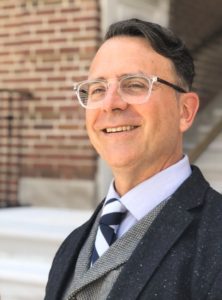Bona Verba from the Headmaster
Recently, I met with a group of prospective parents who had thoughtful questions about our school’s curriculum. These parents were clearly interested in Cincinnati Classical Academy, enough to schedule a meeting, and I was happy to oblige. While much of the information they sought is readily available on our website, including our comprehensive curriculum and reading lists for every grade from K-12, as well as through our Open House events, parent information nights, and parent tours, I welcome any opportunity to engage in these discussions. It’s a chance to explain who we are and why we teach as we do.
One common question I’ve encountered over the past three years, and one posed recently by these prospective parents, is this: Why does Cincinnati Classical Academy focus so heavily on Western civilization—its history, literature, art, architecture, scientific achievements, Judeo-Christian values, and democratic systems? The simplest answer is that we live in the West, and as Americans, we are direct inheritors of the Western tradition. This alone makes it essential to understand the intellectual, cultural, and political foundations of our society.
But the answer goes deeper. We are not only Westerners; we are citizens of the United States, a nation that represents a specific chapter in the Western story. If we aim, as our mission states, to provide instruction in moral character and civic virtue, then understanding the American project is indispensable. This includes grappling with its contradictions and imperfections—from slavery in the 19th century to the challenges of censorship and propaganda in our own times. Studying the West does not mean ignoring its flaws; rather, it means engaging with them honestly, so students can develop informed perspectives and a deeper appreciation of the principles we strive to uphold.
In too many schools today, the study of history and literature—Western or otherwise—has been marginalized or reduced to superficial summaries. But you cannot understand the American political system without understanding its roots in Britain. Nor can you understand Britain without studying Rome, and Rome without Greece. This intellectual chain, spanning millennia, is critical to preparing students for civic life. Without this foundation, students are left vulnerable to oversimplifications and the biases of an academic culture that may not prioritize their intellectual and moral development. Our school motto, Scientia est Libertas (“Knowledge is Freedom”), reflects our belief that true freedom requires knowledge of the ideas and systems that shaped our world.
It is worth addressing a related concern raised by some prospective parents: Does focusing on the Western tradition mean we neglect the rest of the world? The answer is unequivocally no. A walk through our classrooms would quickly dispel this notion. Our fourth graders study Islamic art with care and appreciation. First graders immerse themselves in the rich history of ancient Egypt, and third graders develop a sophisticated understanding of Chinese dynasties. Far from ignoring the non-Western world, we embrace its contributions to the human story as an essential part of our curriculum.
Yet our focus remains rooted in the Western tradition because it is the intellectual and cultural framework we inhabit. To teach otherwise would be to sever students from their heritage and leave them unequipped to navigate their role in its ongoing story. The study of logic provides a fitting example. Next year, our ninth graders will encounter the Dichotomia Fallax—the Either/Or Fallacy, or False Dichotomy. This logical error, identified by Aristotle, a Greek philosopher and pillar of the Western canon, warns against oversimplifying complex issues. It is a false dichotomy to assume that because we teach and emphasize the Western tradition, we exclude or diminish the study of other cultures.
At Cincinnati Classical Academy, we believe that education should prepare students to understand the world they live in and contribute meaningfully to its future. To achieve this, we embrace the Western tradition as our foundation, while also celebrating the richness of the broader human experience. Our approach is not a limitation but an invitation to explore deeply, think critically, and engage fully with the ideas that have shaped—and continue to shape—our world.
Torches Up!
Mr. Michael Rose
Headmaster

Mr. Michael Rose
Meet the Headmaster
Mr. Rose has taught various courses at Brown University, Cincinnati Moeller, and The Summit Country Day School. As a part of his degree work in education, Mr. Rose’s research interests included the Great Books curriculum, the Paideia teaching method, and the “effects of emerging digital technology on student reading, writing, and researching.” Read More

